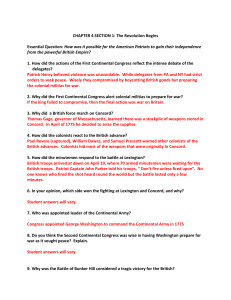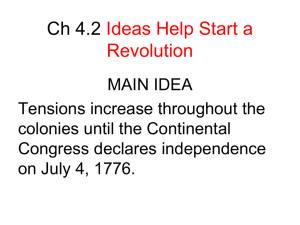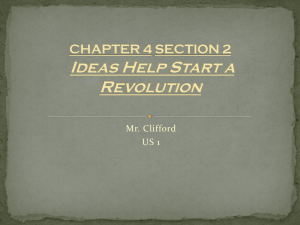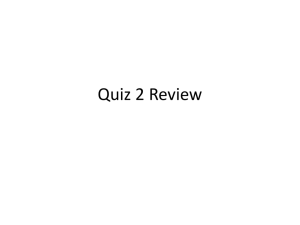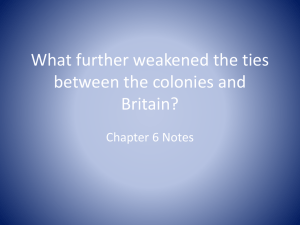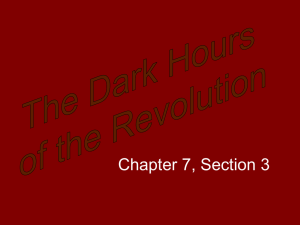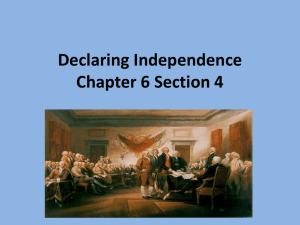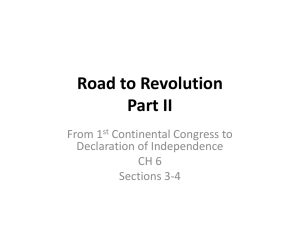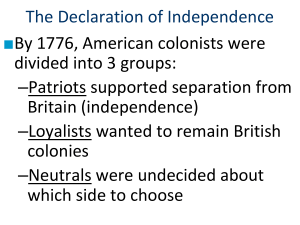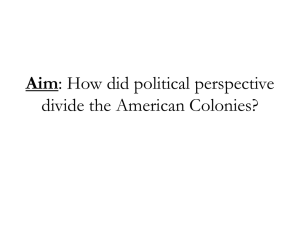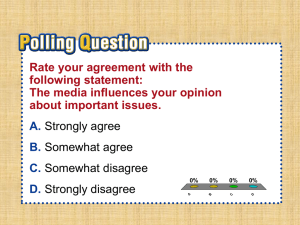File
advertisement
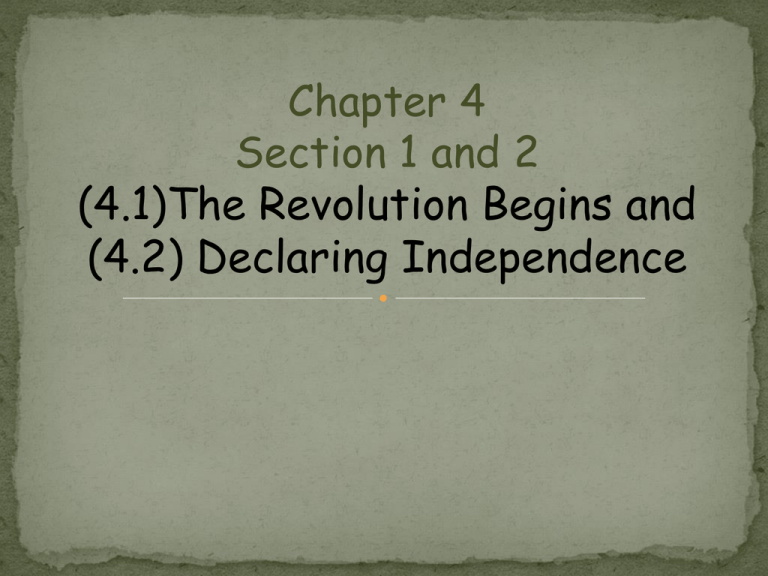
Chapter 4 Section 1 and 2 (4.1)The Revolution Begins and (4.2) Declaring Independence Bell Work - The Path to War Reflect on the 5 major Events/Acts that led us to the eve of the Revolutionary War between the Colonies and the British Crown: - -Describe 4 of these events - -Describe how 1 of them led to the War - “The only good wars are the American Revolution, World War II, and the Star Wars Trilogy” Bart Simpson 4.1 & 4.2 The Big Idea ● The 1st Continental Congress demanded certain rights from Great Britain ● Armed conflict between British and Colonists broke out with the “Shot heard ‘round the World” ● The 2nd Continental Congress created the Continental Army to fight the British ● Tensions between The Colonies and Great Britain led to War ● Thomas Paine’s Common Sense led many to support Independence ● The Colonies formally declared their independence from Great Britain, although the Declaration did not address rights of all colonists 1st Continental Congress - October 1774 ▪ Gathering of Colonial Leaders formed to voice the colonists concerns to King George III ▪ Colonists did not want to separate yet; state concerns and ask King to correct them ▪ Some wanted Peace, others said War was inevitable - continued to boycott goods AND have colonial militias prepare for war ▪ “Declaration of Rights” - 10 resolutions including right to “Life, Liberty, and Property…” Patrick Henry’s famous Quote “They tell us, Sir, that we are weak; unable to cope with so formidable an adversary. But when will we be stronger? Gentlmen may cry, Peace, Peace - but there is no peace. I know not what course others may take; but as for me, give death!” me liberty or give me The Ride of Paul Revere - April 1775 ▪ Patriots - Colonists who wanted independence from G.Britain (formed militia groups to fight in case of an attack by Redcoats) ▪ Redcoats - British soldiers ▪ British Governor of Mass. Thomas Gage learned of Patriots’ stockpile of weapons outside of Boston in Concord - decided to seize them ▪ The Patriots learned of the surprise attack ▪ Revere & William Dawes rode through night warning Patriots that the Redcoats were coming - “One if by land;Two if by sea” Lexington & Concord - The 1st Battles ▪ Minutemen assisted Patriots - local militia nicknamed because they were ready to fight at a minute’s notice ▪ “Shot Heard ‘round the World” - someone (we don’t know on what side) let out a gunshot and then everyone started firing ▪ When the smoke cleared, Redcoats won and moved on to Concord ▪ Patriots force Redcoats back at Concord, killing many along the way 2nd Continental Congress - May 1775 ▪ King George III ignored Dec. of Rights - 2nd CC tried again to voice concerns ▪ First attempt at Republican Government in Colonies ▪ Congress asked Colonies to draw up new Constitutions; Conventions set up to write them ▪ Authorized the Continental Army - all Colonial soldiers united & led by Virginian soldier George Washington ▪ July 5, 1775 Congress presented the King with the Olive Branch Petition but the King would not read it 2 Sides to Every Story Believed in Independence ● Patriot ● Sons of Liberty (Paul Revere) ● Minutemen ● Continental Army soldiers a.k.a. Patriot Soldiers ● Some Native American groups Wanted to Remain Under King George’s Rule ● Loyalists ● Redcoat Soldiers ● Parliment (Crown Officials) ● Most Native American groups ● Enslaved African groups A Tale of 2 Armies King George III and the British Army ● ● ● ● ● Redcoats highly skilled lots of supplies, if not amo used mercenaries had to cross difficult Atlantic George Washington and the Continental Army ● ● ● ● ● Patriots Inexperienced; disorganized low on supplies small navy scrappy - fought for their cause ● helped by other countries ● Both sides low on men/bullets ● Bunker Hill May 1775 Benedict Arnold/Patriots capture Ft. Ticonderoga & large supply of weapons ▪ Patriots told to only “Shoot when you see the whites of their eyes!” ▪ The Redcoats won, but they lost twice as many men - proved the Colonists actually had a shot at taking on British ▪ Dorchester Heights March 4, 1776 - Colonel Henry Knox transports guns/cannons from Ft. Ticonderoga to G.W. & the Continental Army in Boston ▪ When the Redcoats awoke & saw that the GW & Patriots had cannons, they quickly retreated to Canada ▪ The birthplace of the rebellion now in Patriot hands Common Sense by Thomas Paine ● January 1776 - a 47 page pamphlet published anonymously, plain language speaking to the common people ● Changed colonists’ opinion of King George ● Citizens, not Kings and Queens, should make laws ● Economic freedom ● Right to military defense ● Against tyranny - abuse of govt. power “There is something very absurd in supporting a continent to be perpetually governed by an island…” Thomas Paine The Declaration of Independence Background ● June 1776 - committe writes a document declaring Colonies’ Independence ● New Seal - “E pluribus unum” , or out of many, one - recognizing unity ● Main author, Thomas Jefferson ● July 4, 1776 the United States of America was born when Continental Congress approves the Dec. of Independence DOCUMENT IMAGE The Declaration of Independence ● All people posses unalienable rights, including life, liberty, and pursuit of happiness ● King George had violated their rights by taxing them without their consent, passed unfair laws, interfered w their govt., and burdened the Colonists by stationing Army there ● Colonies had inherent right to break from Britain because King broke his end of the deal - The Enlightenment’s idea of a social contract whereas 1) Govt. protect rights of citizens and 2) people agree to be governed ● ***ONLY APPLIED TO WHITE MALES Unfinished Business ● Women - left out ● Abigail Adams tries to get hubby John Adams to include them “Remember the Ladies…Do not put such unlimited power into the hands of the Husbands…” and fails ● Right to vote, own property, etc., not addressed to them ● Enslaved Africans - founding fathers even compared themselves to slaves under British rule ● Steps taken in New England Colonies to end slavery in 1780’s but not in South (United States now) ● Despite Proclamation of 1763, Colonists still quietly settled on the Native Amer lands ● Would become a pattern once we won War
